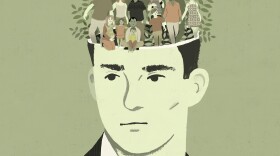
Shankar Vedantam
Shankar Vedantam is the host and creator of Hidden Brain. The Hidden Brain podcast receives more than three million downloads per week. The Hidden Brain radio show is distributed by NPR and featured on nearly 400 public radio stations around the United States.
Vedantam was NPR's social science correspondent between 2011 and 2020, and spent 10 years as a reporter at The Washington Post. From 2007 to 2009, he was also a columnist, and wrote the Department of Human Behavior column for the Post.
Vedantam and Hidden Brain have been recognized with the Edward R Murrow Award, and honors from the American Association for the Advancement of Science, the Society for Personality and Social Psychology, the International Society of Political Psychology, the Society of Professional Journalists, the National Association of Black Journalists, the Austen Riggs Center, the American Psychoanalytic Association, the Webby Awards, the Pennsylvania Associated Press Managing Editors, the South Asian Journalists Association, the Asian American Journalists Association, the Pennsylvania Newspaper Association, the American Public Health Association, the Templeton-Cambridge Fellowship on Science and Religion, and the Rosalynn Carter Mental Health Journalism Fellowship.
In 2009-2010, Vedantam served as a fellow at the Nieman Foundation for Journalism at Harvard University.
Vedantam is the author of the non-fiction book, The Hidden Brain: How our Unconscious Minds Elect Presidents, Control Markets, Wage Wars and Save Our Lives. The book, published in 2010, described how unconscious biases influence people. He is also co-author, with Bill Mesler, of the 2021 book Useful Delusions: The Power and Paradox of the Self-Deceiving Brain.
-
The researchers believe this is because politicians in gerrymandered districts are less likely to advocate for goods on behalf of their constituents.
-
Violent crimes committed by Muslims are much more likely to be reported as "terrorism." And that has disturbing consequences for the way Muslims are perceived.
-
Workers with a strong sales record were likely to be promoted into managerial positions, yet they tended to be worse at managerial jobs than those who were low-performing workers.
-
A culture of racism can infect us all. On this week's radio show, we discuss the implicit biases we carry that have been forged by the society around us.
-
Flight delays and late arrivals have gone down since 1990. At the same time, airlines have increased scheduled flight times because flights are taking longer, and more time is spent taxiing.
-
Unpredictable things happen to us all the time. On this Radio Replay, we mark the new year with two of our favorite stories of loss and the change it brings.
-
Chaos is a part of all of our lives. Sometimes we try to control it. And other times, we just have to live with it. On this week's Radio Replay, we explore different strategies for coping with chaos.
-
Social science research explores how our minds push away information that gets in the way of our feelings and desires.
-
What is it that makes you...you? NPR's Shankar Vedantam explores new research that suggests the labels we use to categorize people affect not just who they are now, but who they'll be in the future.
-
New social science research explores the relationship between who becomes a CEO and family birth order. First-born sons are far more likely to be represented among the ranks of CEOs.










